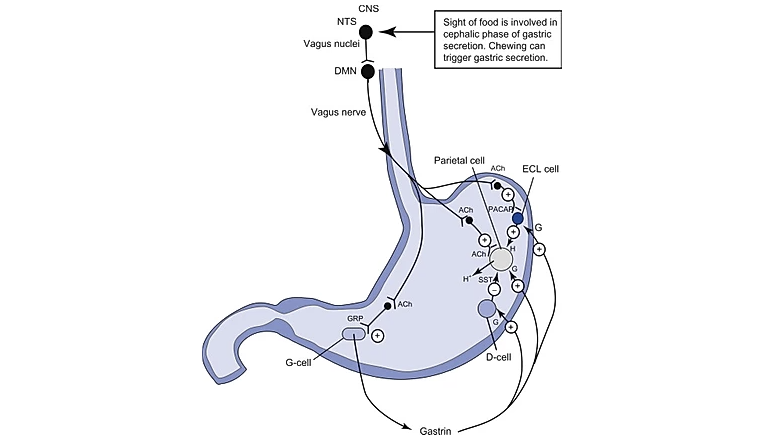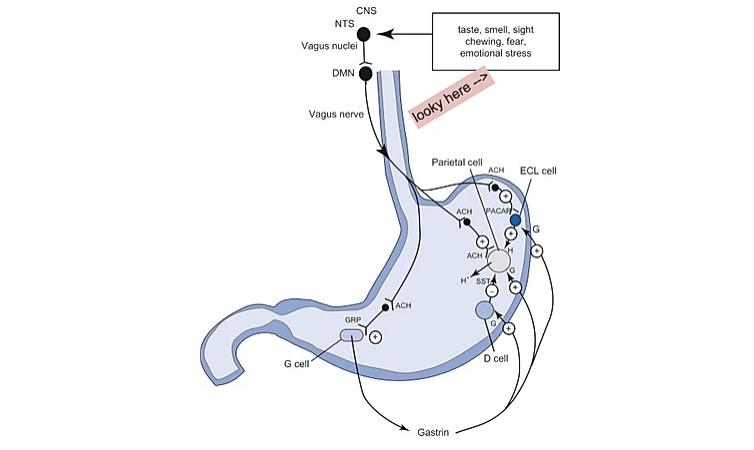Your diet is gorgeous.
Local, in-season veggies, bursting with #phytochemicals and #antioxidants. Pastured, grass-fed #meats that were called by name just last week. Juicy #fruits pulled from a tree in your very backyard.

Diet? It’s on point.
Why, then, do you still feel so #horrible?
Why are you #bloated after every organic apple? Why does that pastured rib-eye sit in your #stomach until the morning after you eat it? Why are you so #nauseous in the morning that you couldn’t eat #breakfast even if you never had heard the phrase #intermittent fasting?
It’s because the maxim is wrong. You are not what you eat.
You are what you #digest.
And if you are not digesting anything, then you will not be #absorbing anything. If you are not absorbing anything, you are not getting any building blocks for your #body.
All disease starts in the gut. But all #healing starts in the gut, too. That’s good news.
A digestive primer
When we start thinking about food, our body secretes #enzymes in preparation to break that food down. This is called the cephalic phase of digestion. For centuries, the cephalic phase of digestion was an integral part of the ebb and flow of daily life. There was no fast food, and meals were a drawn-out and lingering event. Food had to be planned, touched, prepared, and cooked. It took hours for raw materials to manifest themselves as a savory supper or a hearty breakfast. The process of touching and smelling and anticipating set off the cephalic phase of digestion and prepared the body for the food that was coming.
It’s the #vagus nerve that sets off the cephalic phase. The vagus nerve connects the brain and the digestive tract. When food is anticipated, the vagus nerve tells the stomach to start secreting hydrochloric acid in preparation for the digestion that is about to happen. Hydrochloric acid is one part of the chemical equation necessary for the breakdown of food in the body.
You won’t have enough #hydrochloric acid in your body if you are undersalted, or if you eat too alkaline of a diet (really!). Eating more meat increases your ability to digest more meat. You need lots and lots of hydrochloric acid. Most people are deficient, and proton pump inhibitors like #Prilosec and Nexium actually make the problem worse. They delay stomach emptying- you cannot digest your food without enough hydrochloric acid! Proton pump inhibitors are doing you no favors and will make your digestion worse in the the long run, not better. I work with clients to get off of them quickly by optimizing digestion.

As shown above, the act of chewing also stimulates the #stomach to produce enzymes and #acids to begin to break down food. When was the last time you chewed your food thoroughly?
So already, we have two possible problems:
- Do you eat only ready-made foods?
- Do you chew your food until it’s liquid?
Don’t feel bad if you eat a lot of prepared food and scarf it down in the car. One out of three of us eat fast food every day. And that’s just true fast food! Maybe you are like me, and you pick up a rotisserie #chicken at the store every week. Maybe you microwave chicken nuggets for your kiddos in between soccer and youth group. That bumps our fast food statistic up quite a bit. We all need convenience foods because we are all so busy.
But is it the best thing for us? Let’s take another look at our cute little tummy here:

When our #nervous system detects #stress– emotional, physical, or mental- the vagus nerve reacts differently. Instead of telling the body to secrete plenty of acid for digestion, the vagus nerve senses danger. It sends a signal to the body to contract instead of #relax. This results in less hydrochloric acid and less digestive enzymes being released. The body is preparing to run or fight at this point. The vagus nerve tends to work on #parasympathetic functions of the body, or those that are automatic and of a more relaxing state. Think breathing, digesting, and pumping blood through the tissues.
In times of stress, the body has to laser-focus its resources on staying alive amidst the danger around it.
It will shut down functions that it deems less important than survival.
Digestion? Not necessary for survival.
On that note? #Periods: not necessary for survival.
So if you are eating in the car, gulping down your food, fuming over a tiff with your significant other, and planning your work schedule for tomorrow, your body may sense that as a danger. And digestion starts to shut down.
Honestly, it doesn’t even have to be that drastic. If you’re eating an organic rotisserie chicken and local veggies with the TV on and you’re not chewing your food well, you may be putting yourself at risk for impaired digestion.

No judgment. We have all been there. Life is crazy.
Food in the digestive tract
Ok, so you have chewed your food and it has gone down the esophagus and into the stomach. The stomach will start to contract in order to chyme, the mass of food mixed with digestive secretions that function to break the meal down. Protein digestion happens in the stomach with the help of the enzyme protease. But fat still needs to be digested. When the food particles get small enough, small amounts will pass at regular intervals into the small #intestine.
In the small intestine, a glorious substance called #bile is released. Bile is made in the liver and is stored in the gallbladder. When a meal is eaten and digested, bile is released into the small intestine, where it breaks down #fat. You need fatty acids for healthy #neurotransmitters like #serotonin, for #healthy #brain cells, and for healthy #nerves. Without proper breakdown of fat, you may experience some pretty raging mental and emotional issues.
Like this one: #depression risk can increase after the removal of the #gallbladder. If you can’t access any building blocks for a healthy brain, you may be prone to depression.
But gallbladders are removed all of the time- 600,000 each year. It’s normal, right?
Bile functions not only to break down fats, but also to remove waste products stored in the body. You need plenty of liver/gallbladder action to remove bound up #estrogens and toxins in the body.
In fact, women on #birth control (synthetic #estrogen) and #hormone replacement therapy are more likely to experience gallstones. Even #pregnant women have a greater likelihood of getting gallstones! This means that excess and unopposed estrogen in the body has a detrimental effect on the #liver and the gallbladder.
Be wary of using birth control or hormone replacement therapy without knowing all of the risks. It’s likely that not many doctors that warn you about the increased risk of painful gallstones when they hand out birth control like candy for something as easy to fix as acne.
To make healthy bile, you need plenty of cholesterol. That’s right! Cholesterol. It’s not bad for you to eat cholesterol-rich foods, remember?
But you also need the following:
- Water
- Electrolytes like sodium, potassium, and #magnesium
- Phospholipids (egg yolk, fatty fish)

And without these components, you can’t make healthy bile. Which means you can’t break down your fat. Or absorb it or use it.
So you need plenty of hydrochloric acid.
And you need plenty of bile.
And you need enough of these two things in order to make the following happen in your tummy:
A little mini volcanic eruption ought to happen after every meal. I am not talking about explosive and painful gas. I am talking about a chemical reaction that you ideally do not even feel.
Remember the science experiment you did in fourth grade where you poured vinegar onto baking soda and made that cool volcanic eruption? That’s what happens in optimal digestion.
Hydrochloric acid: acid (vinegar)
Bile: alkaline base (baking soda)
Result: beautifully digested and assimilated food.
No gas. No bloating. No food sitting in your stomach. No nausea. No broken nails, or lackluster hair. No depression or anxiety. No micronutrient deficiencies (I won’t run an organic acids test without optimizing digestion first- why bother!?) No bad breath or SIBO or constipation or diarrhea.
Ok, you won’t achieve perfection. That’s not realistic and we know it. But what if many of your seemingly unrelated symptoms are simply associated with bad digestion?
I put all of my current 28 Day Resetters on digestive enzymes. I run the GI MAP on anyone who will let me. We have to clear infection and work hard to optimize digestion. This takes a lot of time, and considerable effort. Get ahold of me if you need help.
It’s taken me 4 years to work through digestive issues, and I am still going. It is a process, and I am still actively learning. Every little step forward is exciting, though, and another piece of the puzzle locks firmly into place.
If you want to work on digestion by yourself, here are a few tips:
- Make meals at home as much as possible
- Chew your food as thoroughly as you can
- Drink 1 tbsp of apple cider vinegar with each meal
- Consume 1-3 tsp of natural salt per day (less if you have diarrhea, more if you have constipation)
- Get fermented foods in your diet like saurkraut juice
- eat egg yolks and fatty fish for healthy bile
- rest your digestive tract for 12 hours each day so bile can be created and stored
- eat bitter foods like celery and asparagus and black coffee for liver health
- stay away from sugar and alcohol as much as possible
- drink lots of filtered water
- focus on food quality like organic, pastured, grass-fed only if your digestion is optimal. Otherwise, it’s a waste of money.
What do you think? Do you have any other tips for healthy digestion? Questions? I’m all ears.






